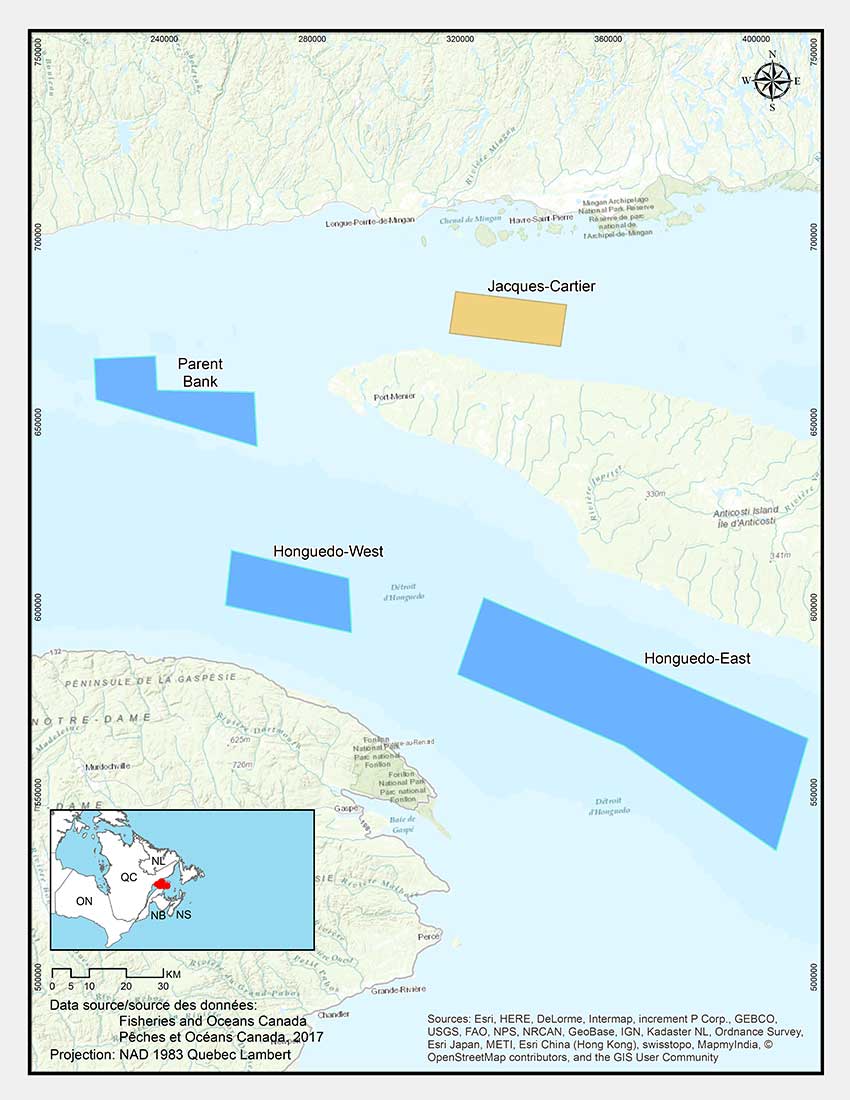Jacques-Cartier Strait Sponge Conservation Area
- Location
- Estuary and Gulf of St. Lawrence Bioregion (Quebec, New Brunswick, Nova Scotia, Prince Edward Island, Newfoundland and Labrador)
- Approximate Size (km2) contribution to Marine Conservation Targets
- 346 km2
- Approximate % coverage contribution to Marine Conservation Targets
- <0.01%
- Conservation Objective
- Cold-water sponge protection
Ecological Components of Interest
Species of regional importance: cold-water sponges
- Why they are important: Cold-water sponges are fragile, slow to recover, structure-providing species.
Habitat that is important to biodiversity conservation: cold-water sponges
- Why it is important: This conservation area features the highest concentration of sponges among all of the coral and sponge conservation areas established in the Estuary and Gulf of St. Lawrence bioregion. Some cold-water sponges create structures that provide diverse habitat for many other species.
Prohibitions
The ecological components of interest are effectively conserved through the following prohibitions:
All fishing that uses bottom-contact gear, such as bottom trawls, dredges, bottom seining, traps, gillnets, and bottom longlines.
Other Considerations
No human activities that are incompatible with the conservation of the ecological components of interest may occur or be foreseeable within the area.
Environmental Context
This conservation area includes part of a community of sponges classified as a significant benthic area (CSAS SAR - 2017/007) in the Estuary and Gulf of St. Lawrence bioregion. The area also includes other important biological features, such as a high concentration of Gersemia rubiformis soft corals, and the presence of the large structure-providing Hemigellius arcofer sponge. This is an area known for its high biodiversity; it is home to many benthic species and used by birds and marine mammals.
High concentrations of these corals and sponges create habitat with complex structures that provide refuge, feeding, and rearing areas for many marine species, thus supporting greater biodiversity.
Prohibiting bottom-contact fishing gear makes it possible to directly protect the fragile structure of corals and sponges, and can also help protect the fish and invertebrate species that rely on this habitat.

Jacques-Cartier Strait Sponge Conservation Area
Note:
Following the signing of the Canada–Quebec Collaborative Agreement to Establish a Network of Marine Protected Areas in Quebec in March 2018 (available in French), the governments of Canada and Quebec are evaluating the possibility of reinforcing coral and sponge conservation measures in the Gulf of St. Lawrence by prohibiting certain activities other than fishing in certain zones.
Learn more about the Northern Gulf of St. Lawrence marine protected area project.
- Date modified: